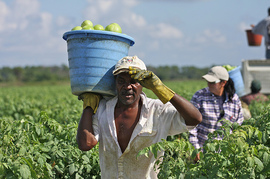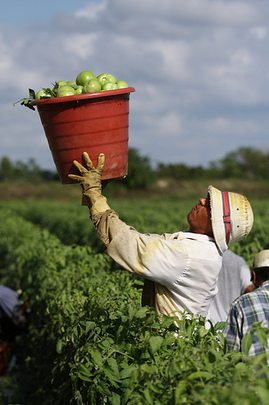Bearing the fruits of their labor
 "We used to own our slaves -- now we just rent them."
"We used to own our slaves -- now we just rent them."Those were the words a Florida farmer used to describe his migrant farmworker labor force to reporter Edward R. Murrow in the classic 1960 Thanksgiving television documentary Harvest of Shame. The documentary would go on to shock U.S. viewers with its depiction of the bleak plight of the Florida farmworkers who put food on America's tables.
Fast forward 50 years later and still much of their story remains the same. Just replace the African-American migrants of the 1960s with the Mexican, Central American and Haitian immigrants of today.
These farmworkers are responsible for putting food on most of our tables, yet they remain among our country's most vulnerable groups. These tomato pickers endure low pay and dangerous job conditions. They work seven days a week, between 10 to 12 hours with no overtime pay, no health insurance, no sick days, no benefits and no job security. They often have wages withheld, face beatings and violence, and live in deplorable living conditions where they are packed like sardines into trailers. In the most extreme cases they are enslaved.
With some U.S. labor laws still mired in the legacy of racism, laws offer few protections for farmworkers who are not guaranteed the legal right to overtime pay or collective bargaining, and who can be fired at will. Three-fifths of all farm workers in the U.S. earn less than $10,000 a year.
Despite the harsh conditions of their labor, over the past few years a small group of migrant workers from southwest Florida have been making waves across the country in their battle for worker justice. They have waged one of the most successful labor campaigns in a generation.
Led by the Coalition of Immokalee Workers (CIW), a South Florida-based grassroots workers' rights organization, these farmworkers have gone on to win major, landmark victories against some of the largest corporations in the United States.
Sweatshops in the Fields
Immokalee, the heart of Florida's fruit and vegetable industry, is an area in southwest part of the state about 40 miles inland from the Gulf of Mexico. Between December and May, Florida produces virtually the entire U.S. crop of field-grown fresh tomatoes. Immokalee itself produces the largest supply of fresh tomatoes for many of the nation's supermarkets and for some of the biggest fast-food chains in the world.
The CIW came together in 1993 when a few dozen Immokalee tomato pickers began meeting in a local church to begin to address the plethora of labor rights abuses plaguing Florida's farmworkers. They first organized to demand better conditions from their bosses who worked for suppliers. But that brought little relief so the group returned to the drawing table. They went on to sketch out an ingenious plan to target the price setters instead of the growers. The CIW found out that companies such as Taco Bell set the prices for tomatoes and they decided to forego the middlemen and go straight to the top.
The CIW also worked to expose human trafficking and to uncover slavery in Immokalee-area farms. Their work led to several high-profile convictions of Florida agricultural contractors and the freeing of more than 1,000 workers. The coalition's work uncovering slavery garnered three workers the Robert F. Kennedy Human Rights Award in 2003.
Booting the Bell
It's a modern-day David vs. Goliath story. At a time when much of the labor movement is struggling, particularly in the South where unionization rates and benefits continue to plummet, this small group of workers took on the major players of the fast-food industry. And won.
In 2001, CIW launched the Campaign for Fair Food targeting the major fast-food corporations responsible for buying vast amounts of tomatoes, and who therefore have tremendous buying power to demand low prices. They first targeted Taco Bell and their parent company, Louisville, Ky.-based Yum! Brands, the world's largest restaurant company and an important buyer of Immokalee tomatoes.
The CIW's "a penny extra per pound" campaign simply involved asking companies to pay a penny more per pound to workers harvesting tomatoes for them. This doesn't sound like much, but it represents an improvement to workers who currently make an average of 45 cents per 32-pound bucket. This sub-poverty wage system is based on an antiquated piecemeal rate where farmworkers are paid by the amount of fruits and vegetables they pick. The system has remained virtually the same since 1980. That means workers have to pick about two-and-a-half tons of tomatoes a day, nearly an impossible task, in order to reach minimum wage.
When the CIW began its nationwide consumer boycott against Taco Bell, workers left the fields to carry their protest and demands across the country. Campus groups and dozens of faith groups endorsed the boycott, with students taking a strong role as ambassadors of the cause. "Boot the Bell" campaigns by students, through the Student/Farmworker Alliance (SFA), blocked or forced Taco Bell from more than 20 campuses, and boycott campaigns were held at more than 300 universities and high schools. The CIW launched an annual "Taco Bell Truth Tour," where buses were loaded with Immokalee farm workers on a 15-city publicity campaign.
The campaign was a hard-fought one and lasted for four years. In the end Taco Bell committed to new labor rules. The agreement called for a pay a penny per pound increase to workers harvesting tomatoes for Florida tomato suppliers. Taco Bell also agreed to work with the CIW to develop an enforceable, human rights based code of conduct to address human rights violations, including modern-day slavery in the fields.
The victory resulted in a 71 percent raise for each 32-pound bucket picked for Taco Bell.
Toward a Fair-Food Nation
Following on the heels of the Taco Bell victory, CIW next targeted McDonald's. After two years of campaigning, in April 2007, they reached an agreement with the world's largest restaurant chain that expanded on the agreement with Yum! Brands. Agreements with Burger King and Whole Foods Market followed in the summer of 2008.
This past week, Subway -- the third largest fast-food chain in the world and the biggest fast-food buyer of Florida tomatoes -- reached an agreement with the CIW. With this victory, the four largest restaurant companies in the world have now agreed to better working conditions for their tomato pickers. This is a huge testament to the amazing organizing skills of these Southern farmworkers. In eight years of campaigning they have managed to establish a new standard of social responsibility for the fast-food industry.
"The vision of a food system that ensures human rights for farmworkers is one that, even now, is beginning to bear fruit," the CIW said in a press release announcing the Subway victory this week.
The lessons learned have been valuable. The CIW has grown to more than 4,000 members and used numerous tactics -- work stoppages, hunger strikes, cross-country tours, long-distance marches, and alliance-building with supportive community, labor, faith and student groups to win raises and respect for farm workers. What began as a small group of indigent, abused and ignored farm workers spawned a national movement for food justice.
 The struggle for food justice is important to the South, a region whose agricultural belt is often under-regulated and filled with worker exploitation and renegade industries. Poverty and modern agricultural work go hand and hand in the region. What the CIW has come to term the "fair food" movement calls for transparency in the food supply chain and brings attention to how food is grown and how it works its way from farm to table, from production to distribution.
The struggle for food justice is important to the South, a region whose agricultural belt is often under-regulated and filled with worker exploitation and renegade industries. Poverty and modern agricultural work go hand and hand in the region. What the CIW has come to term the "fair food" movement calls for transparency in the food supply chain and brings attention to how food is grown and how it works its way from farm to table, from production to distribution. "Now that Subway, the largest fast-food buyer of Florida tomatoes, has joined Yum!, McDonald's, Burger King, and Whole Foods Market in working with the CIW," the farmworkers group said in a press release, "it's time for the rest of the grocery and fast-food corporations to join their counterparts and partner with the CIW to elevate human rights for farmworkers in their own supply chains."
The work of the CIW serves as an important case study and model of coalition building, grassroots leadership and effective labor and community organizing. The work of CIW is often compared to the work of Cesar Chavez and California's United Farm Workers during the grape boycott.
As Facing South reported before:
The impact of these agreements can't be underestimated. They will improve the lives of tens of thousands of farmworkers and their families, who find themselves toiling at the bottom of a new plantation economy in the South and beyond -- including a system of modern-day slavery."We just want to be recognized as human beings, we want to be recognized as people who work hard and have the same rights as anyone else," farm worker Norberto Jimenez told In These Times in 2007. "It shouldn't matter if we're from another country or that we're just tomato pickers. We are human beings and we should be treated with dignity."
These victories also signal to corporations eager to exploit immigrant and undocumented labor that these workers cannot be scared into accepting attacks on their livelihood and dignity.
For more about the Coalition of Immokalee Workers and their campaign, visit here.
(Photos of Immokalee tomato pickers from the CIW's Web site)
